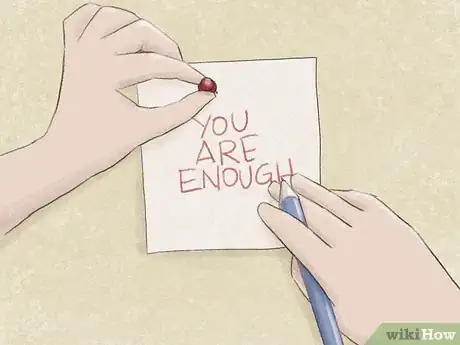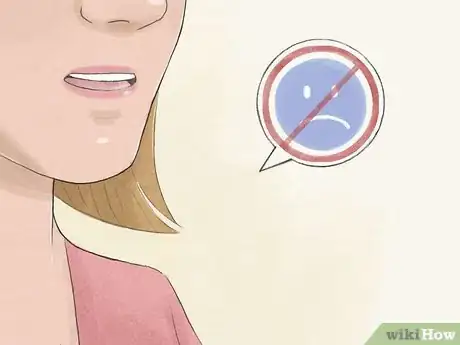This article was co-authored by Leah Morris. Leah Morris is a Life and Relationship Transition coach and the owner of Life Remade, a holistic personal coaching service. With over three years as a professional coach, she specializes in guiding people as they move through both short-term and long-term life transitions. Leah holds a BA in Organizational Communication from California State University, Chico and is a certified Transformational Life Coach through the Southwest Institute for Healing Arts.
There are 11 references cited in this article, which can be found at the bottom of the page.
This article has been viewed 19,938 times.
Self-pity is a natural reaction to difficult situations. Recognizing that you are in a downward spiral of self-pity is a good first step towards pulling yourself out of it and starting to feel better. Start by learning what causes you to feel self-pity and take steps to stop a spiral before it gets out of control. You can also start to build confidence by focusing on your strengths and forming healthy habits like eating well and exercising.
Steps
Stopping a Downward Spiral
-
1Learn when a downward spiral is starting. You may catch yourself thinking something like, "I'm not good enough," or avoiding activities you would normally like to participate in. Once you notice you are starting to have negative thoughts about yourself, take steps to stop them.[1]
- Sometimes recognizing the start of a downward spiral is enough to stop it. Check in with yourself throughout the day and week and notice what frame of mind you are in. If you feel self-pity, you may still be in a downward spiral.
-
2Face your feelings. There's a reason you're feeling self-pity. Take some time to recognize that grief, loneliness, and disappointment are all normal feelings.[2] Try writing about what you are experiencing in a journal or discussing it with a friend or therapist. Talk or write out what you are feeling and why.[3]
- The only way to get through negative feelings is to feel them and let them pass.
Advertisement -
3Take a few minutes to breathe deeply. Sit somewhere comfortable where you can be alone. Close your eyes. Focus only on your breathing and try to let go of any thoughts at all. Instead, feel how the breath fills up your nose, throat, lungs, and stomach. This will help you relax and focus on feeling better.[4]
-
4Forgive yourself for your mistakes. When you feel self-pity, it's easy to focus on the bad. Acknowledge and accept that you are not perfect. Cut yourself some slack for imperfections.[5]
- Recognize that fixating on the bad likely isn't a reflection of reality. Your mistakes and imperfections usually aren't as bad as you think they are.
- For example, you might be feeling self-pity because you were rejected for a job you really wanted. Instead of fixating on the things you may have done wrong, remind yourself that you did your best and it just wasn't the right fit.
-
5Write yourself a reminder. Write down something you need to remind yourself of, and put it somewhere you will see it often. For example, write "you are enough" on a sticky note and leave it on your bathroom mirror.[6]
- You can also leave yourself a note on your phone and set it as a daily reminder so that you see it every day.
-
6Think about the situation as an opportunity to grow. Find meaning in the situation that caused your downward spiral. What caused it? What does that tell you about yourself? How can you learn from your situation?[7]
- It can be hard to think about your situation optimistically when you're in a downward spiral. Try thinking about your future self–yourself in a year or 5 years. What will you have gained from going through this?
-
7Avoid situations that make you feel bad about yourself. Once you recognize situations or people that can start a downward spiral for you, avoid them altogether. This will make it easier for you to build self-confidence and stop self-pity.[8]
- Don't be afraid to set firm boundaries.
- For example, if you notice that you always feel drained or exhausted after spending time with a friend, try taking a break from hanging out with that friend for a while. Spending time with people who make you feel good will help you develop a more positive mindset.
Boosting Self-Confidence
-
1List your strengths and achievements. List out any wins you've had, big or small. Write down things you like about yourself and things you do well. Remind yourself of your positive qualities.[9]
- If you can't think of enough items for a list, try listing one thing every day. Small positives might be making a delicious homemade dinner, getting to the gym, spending quality time with a friend, or taking time for self-care. Bigger positives could be winning an award, getting a new job or promotion, or graduating from school. Qualities could include being a good listener, being smart, being resilient, or being honest.
- Keep a designated journal for listing your positive moments and features.
- You can also ask a supportive friend or relative to help you come up with some of your best qualities.
-
2Find a confidence role-model. Do you know someone who always seems confident and self-assured? Notice how they move, speak, and act. Think about ways you can model your behavior based on theirs. Start with something small. Maybe your confidence role-model always stands up straight and has a firm handshake. Try to copy that first.[10]
- Just being around people who are self-confident can help boost your confidence, too.
-
3Focus on hygiene and physical activity. When you're feeling down, it's easy to neglect taking care of yourself, but simple actions can build your self confidence. Brush your teeth, take a shower, and go for a walk to start. Wear clothes you feel good in.[11]
- If you're up for it, spending 20 minutes getting your heart rate up at the gym is a healthy habit that can help you feel confident.
-
4Eat a healthy diet. Nourish your body with lean protein, like fish, poultry, and legumes, and eat 5 daily servings of fruits and vegetables.[12] Avoid fast food, sugary drinks, and processed foods.[13]
- Remember that the most important part of any diet is moderation. If there are comfort foods that you enjoy eating, you can still enjoy them, but try to incorporate them into a balanced diet.
-
5Get enough sleep. Being well-rested will help you feel your best. Most adults need around 8 hours of sleep every night. However, spending too much time in bed can make you feel sluggish and lethargic. Set a bedtime and wake-up time for yourself.[14]
- Create a nightly routine, such as putting away electronics an hour before you go to sleep and reading for fun.
-
6Spend some time on your hobbies. Spending some time on an activity that you truly enjoy can help break you out of a negative mindset. Focus on something that brings joy or meaning into your life. For example, if you enjoy playing an instrument, spend some time playing some of your favorite songs.[15]
- In addition to building your confidence, practicing a hobby can give you new skills and let you explore your interests.
-
7Practice gratitude. Start a gratitude journal by writing down something that makes you thankful today. Big or small, write down one thing every day that makes you grateful. This will help you start looking for positive things every day.[16]
- If you don't have the time to keep up a gratitude journal, try making a list that you can look back on when you want to focus on the positives in your life. Or, start small by writing in your gratitude journal 1-3 times a week.
-
8Do something helpful to others. If you have the time and energy, you can look for volunteer opportunities. But doing something helpful doesn't have to take a lot of time. Ask someone close to you, like a friend or a partner, if you can do something small to brighten their day.[17]
- Try buying a friend their favorite kind of tea or coffee, or making breakfast for your significant other.
Developing a Positive Mindset
-
1Start your day with some positivity. Take a few minutes to focus on an affirmation like, "I am a loving, caring person who deserves to be happy.” Repeat your affirmation to yourself in the mirror before you start your day.[18]
- Even if you struggle to believe what you say at first, hearing yourself say these affirmations aloud helps your body feel the positive energy regardless.[19]
- If affirmations aren't your cup of tea, try watching a motivational video, listening to a positivity podcast, or spending a few minutes reading something positive and inspirational.
-
2Keep complaining to a minimum. When you're feeling down, you might get the urge to complain about your situation to those close to you. However, this can actually make you feel worse. Complaining about a situation means you are spending more time thinking about the negatives than taking action.[20]
- If you have a habit of complaining, try easing yourself out of it by setting a time limit for yourself. For example, you might allow yourself to complain for 5 minutes at dinner time. Then, focus on something else.
- Also try avoiding others who complain a lot. It can be hard to stop complaining if the people around you complain, too.
-
3Praise yourself for your successes. When you feel self-pity, you might be tempted to minimize your accomplishments. For example, you might say something like, "I only went to work today and went straight home. I didn't do anything." Instead, recognize that you got out of bed and put in a productive day at work.[21]
- Give yourself credit for all of your wins, even the small ones.
-
4Reframe negative thoughts in a positive way. If you have a discouraging experience, a self-pitying response might be to treat yourself like a failure. To develop a positive mindset, turn those negative thoughts into ways you can learn or grow.[22]
- Rather than thinking something like, "I shouldn't have even tried that," you can think, "I'm glad I had this learning experience so that next time I can do better."
- Doing this can also help you accept wins, as well. Rather than thinking, "I can't believe I got so lucky," you can take credit and think, "I put in a lot of work to make that happen!"
-
5Focus on the present moment. A lot of negativity comes from imagining bad outcomes to your present actions. For example, you might stress yourself out about your boss's reaction if you show up to work 5 minutes late. However, negative reactions are almost never as extreme as you imagine. Instead, just focus on getting to work safely and doing your best.[23]
- A good way to identify a negative mindset is when you catch yourself thinking of worst-case scenarios. If you catch yourself thinking you might get fired for showing up 5 minutes late to work where you otherwise do well, your thoughts probably aren't grounded in reality.
- Focusing on the present can also help you practice gratitude and notice small positive things. You might be late to work, but maybe you got to spend 5 extra minutes making your coffee exactly the way you like it, making you feel more prepared for the day.
Expert Q&A
-
QuestionHow do I calm down?
 Leah MorrisLeah Morris is a Life and Relationship Transition coach and the owner of Life Remade, a holistic personal coaching service. With over three years as a professional coach, she specializes in guiding people as they move through both short-term and long-term life transitions. Leah holds a BA in Organizational Communication from California State University, Chico and is a certified Transformational Life Coach through the Southwest Institute for Healing Arts.
Leah MorrisLeah Morris is a Life and Relationship Transition coach and the owner of Life Remade, a holistic personal coaching service. With over three years as a professional coach, she specializes in guiding people as they move through both short-term and long-term life transitions. Leah holds a BA in Organizational Communication from California State University, Chico and is a certified Transformational Life Coach through the Southwest Institute for Healing Arts.
Life Coach Closing your eyes and taking some deep breaths for 30 seconds can make a big difference in calming you down.
Closing your eyes and taking some deep breaths for 30 seconds can make a big difference in calming you down. -
QuestionHow can I think more positively?
 Leah MorrisLeah Morris is a Life and Relationship Transition coach and the owner of Life Remade, a holistic personal coaching service. With over three years as a professional coach, she specializes in guiding people as they move through both short-term and long-term life transitions. Leah holds a BA in Organizational Communication from California State University, Chico and is a certified Transformational Life Coach through the Southwest Institute for Healing Arts.
Leah MorrisLeah Morris is a Life and Relationship Transition coach and the owner of Life Remade, a holistic personal coaching service. With over three years as a professional coach, she specializes in guiding people as they move through both short-term and long-term life transitions. Leah holds a BA in Organizational Communication from California State University, Chico and is a certified Transformational Life Coach through the Southwest Institute for Healing Arts.
Life Coach Try looking at negative events with more curiosity instead of trying to turn a negative into a positive right away. Ask yourself why the event was negative, how you can begin taking steps in a positive direction, and what lesson you can gain from negative events at the end of the day. It's all about growth and knowing that we can handle those negative situations when they come up again.
Try looking at negative events with more curiosity instead of trying to turn a negative into a positive right away. Ask yourself why the event was negative, how you can begin taking steps in a positive direction, and what lesson you can gain from negative events at the end of the day. It's all about growth and knowing that we can handle those negative situations when they come up again.
References
- ↑ https://www.skillsyouneed.com/ps/confidence.html
- ↑ Leah Morris. Life Coach. Expert Interview. 19 June 2020.
- ↑ https://www.psychologytoday.com/us/blog/what-mentally-strong-people-dont-do/201505/9-ways-get-past-self-pity
- ↑ https://www.oprah.com/omagazine/mood-makeover-5-ways-to-break-a-downward-spiral/all
- ↑ https://www.psychologytoday.com/us/blog/what-mentally-strong-people-dont-do/201505/9-ways-get-past-self-pity
- ↑ https://www.positivityblog.com/stop-feeling-sorry-for-yourself/
- ↑ https://positivepsychology.com/self-compassion-5-steps/
- ↑ https://www.psychologytoday.com/us/blog/hide-and-seek/201205/building-confidence-and-self-esteem
- ↑ https://www.positivityblog.com/stop-feeling-sorry-for-yourself/
- ↑ https://www.skillsyouneed.com/ps/confidence.html
- ↑ https://www.psychologytoday.com/us/blog/hide-and-seek/201205/building-confidence-and-self-esteem
- ↑ Leah Morris. Life Coach. Expert Interview. 19 June 2020.
- ↑ https://www.psychologytoday.com/us/blog/hide-and-seek/201205/building-confidence-and-self-esteem
- ↑ https://www.psychologytoday.com/us/blog/hide-and-seek/201205/building-confidence-and-self-esteem
- ↑ https://www.oprah.com/omagazine/mood-makeover-5-ways-to-break-a-downward-spiral/all
- ↑ https://ggia.berkeley.edu/practice/gratitude_journal
- ↑ https://www.lifehack.org/articles/lifehack/63-ways-to-build-self-confidence.html
- ↑ https://www.inc.com/geoffrey-james/how-to-create-a-positive-attitude.html
- ↑ Leah Morris. Life Coach. Expert Interview. 19 June 2020.
- ↑ https://www.psychologytoday.com/us/blog/what-mentally-strong-people-dont-do/201505/9-ways-get-past-self-pity
- ↑ https://www.psychologytoday.com/us/blog/click-here-happiness/201803/think-positive-11-ways-boost-positive-thinking
- ↑ https://www.inc.com/geoffrey-james/how-to-create-a-positive-attitude.html
- ↑ https://www.inc.com/geoffrey-james/how-to-create-a-positive-attitude.html













































































